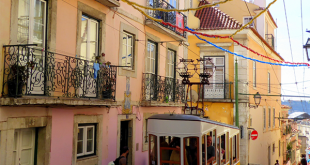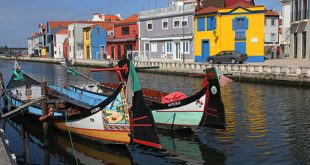The cost of living in Portugal is one of the main reasons why expats love this country. Along with its stunning weather, its fascinating culture and beautiful landscapes, Portugal has as well become an increasingly popular study destination in Western Europe. But what’s the cost of living in Portugal like for students? In this article, we’ll cover the expenses you can expect from living in Portugal as a student, from tuition fees, to housing and transportation to food costs, entertainment, and more.
Table of Contents
Is it expensive to study in Portugal?
As I’ve already mentioned, Portugal is one of the most affordable countries in Europe. And the budget-friendly experience in the country is the main reason students choose Portugal as their study abroad destination. From university fees to housing expenses and groceries, it just cost less in Portugal. And compared to other popular countries, you can expect to pay 30 to 40% lower than what you’ll spend in the UK or the US for example.
For students, universities in Portugal offer some of the most affordable degrees in Europe. The country is safe and peaceful, and more good news, this affordable cost of living doesn’t mean low quality of life. You have all the ingredients to enjoy the full study abroad experience, and you don’t even have to break the bank to get it!
How much does it cost to study in Portugal for international students
Tuition fees in Portugal vary depending on the academic level, the study program, as well as the type of university: public or private one. Usually, public universities in Portugal charge almost half than the cost that private universities apply. Moreover, public universities have annual payment while private universities offer the option of paying your tuition fees monthly.
Besides, medicine, veterinary as well as engineering programs are the most expensive ones in Portugal. On the other hands, courses related to art and literature are the less costly ones. Last but not least, tuition fees for non-EU students are higher than what Portuguese universities charge to EU/EEA students.
Tuition fees at public universities in Portugal for international students
Public universities and polytechnics in Portugal are free to adopt the amount of “propinas” (tuition fees) they charge to their students. However, a minimum is fixed by the Ministry of Education, which varies according to the country’s minimum national wage rate. And the Portuguese law states that students have to pay a minimum tuition fee that is equal to 1.3 times this minimum national wage rate.
This brings the tuition fees range at most public universities in Portugal at:
- 950 to 1,250 euros per year on average for a bachelor’s and a master’s degree
- An average of 2,500 to 3,000 euros per year for third cycle programs (PhD)
Some programs, on the other hand, can cost up to 7,000 euros per year, especially if you study at one of the top universities in the country. Moreover, part-time students in Portugal pay 70% of the full tuition. And exchange students may get a tuition waiver at public universities. This depends on the agreement between the Portuguese institution and its counterpart in the student’s home country.
Private universities’ tuition fees
At private institutions, tuition fees are higher, yet they remain lower when compared to other countries such as the US, UK, or Australia. In general, they’ll charge more than 7,000 euros per year for some programs, with the possibility to pay even a higher cost for non-European students.
Cheapest universities in Portugal
Here are some Portuguese universities that charge some of the most affordable study cost:
- Instituto Superior Técnico: from 1,063 euros per year
- Lusophone University of Humanities and Technologies: from 500 euros per year
- University of Minho: from 1,037 euros per year
- University of Porto: from 871 euros tuition fees per year
There are, of course, some scholarships available, mostly based on academic merit. They can take the form of a discount on the tuition fee, or a contribution to the student’s accommodation and food costs.
How much does it cost to live in Portugal on student visa?
It’s no secret that Portugal is one of the most budget-friendly countries in Europe. Whether you’re looking to move to a big city or a small town, you can expect to spend an average living cost of 500 – 800 EUR per month – great news if you’re a student on a limited budget!
Lisbon, the capital, is the most expensive, while smaller cities such as Porto and Coimbra are the least expensive. This attractive cost of living is a large draw for international students, who can also work part-time to make some extra money.
Accommodation cost
First thing when you budget for your living cost: the place where you’re going to live in Portugal. There are approximately 50,000 international students in Portugal. And they stay either in universities’ halls of residence, private halls of residence, studios or one-room apartments, flat-share in a 3 or more-bedroom apartment, and homestay in a Portuguese family.
The average prices for some of the most sought student housing options in Portugal are:
- Student halls of residence: between 150 and 250 euros per month.
- Room in a private residence hall: between 150 and 550 euros per month.
- Studio and apartments: between 200 and 800 euros per month.
- Three-bedroom apartments: you share the rent and utility bills which amount between 725 and 1,100 euros per month.
- Homestay: the average rent is around 500 euros per month including one daily meal.
Keep in mind that the rental market in Portugal is not expensive. It’s not difficult to find a place that will cost you less than 450 euros per month. Also, most institutions of higher education in the country have residences for their students, so check with your university first. Lastly, if you plan to rent a studio or share an apartment, always make sure to find out if the utilities are included in the rent or not. This extra-expense can cost you an extra 100 euros per month in some cases!
Food cost
For your monthly food and groceries in Portugal, expect to spend between 150 and 200 euros. Eating out will always be more expensive than cooking your own food. But you can always get affordable meals at your university canteen for around 2 to 5 euros. Moreover, you can shop for groceries at affordable places such as Continente/Modelo, Lidl, Jumbo and Pingo Doce.
If you want to eat out once in a while, you can get a meal at a small restaurant for 5 to 8 euros. And if you plan to go for the Portugal’s prato do dia (dish of the day), it will generally cost you between 8 and 11 euros per person. It’s usually a complete, sit-down meal which price depends on the location. In most expensive places, a dinner for two will cost about 35 euros.
Transportation costs in Portugal
You can enjoy a public transportation pass in Portugal by paying between 19 and 55 euros per month. A one-way bus ticket is between 0.8 and 1.5 euros. A tram ticket on the other hand will cost 1.5 to 3 euros, while a taxi fare costs 0.47 euros for 1 km travel.
There is also the metro travel card that costs around 25 euros per month. In some small cities, you won’t need to pay for transportation, since you can easily walk throughout the city. Finally, to visit other cities in Portugal, you can easily get a train ticket. The prices start at 25 euros for a trip.
Other living cost in Portugal for students
If you don’t live in residence halls in Portugal, you usually have to consider paying utility bills. This will cost you around 100 euros per month. Other living expenses include:
- Internet connection: around 30 euros per month
- Cinema ticket: around 7 euros for one person
- Museum entrance fee: between 1,5 and 15 euros
- Sports club monthly subscription: around 30 euros




 Aljawaz Your guide to study abroad
Aljawaz Your guide to study abroad








